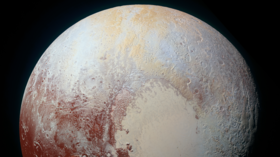Pluto may boast massive life-supporting hidden ocean and water-spewing icy volcanoes

Ammonia has been found on Pluto suggesting that a salty ocean that could contain the vital ingredients for life is hiding beneath the dwarf planet’s icy surface.
The discovery was made by scientists who were analyzing data collected by NASA’s New Horizons probe during a flyby in 2015. They found evidence of ammonia in areas of Pluto that have previously been shown to have likely experienced tectonic activity.
The distribution of ammonia found indicates that it erupted out of cryovolcanic vents, meaning that Pluto could be home to icy volcanoes that spew out sub-zero liquid water and gases such as ammonia and methane. Ammonia acts as a type of antifreeze that lowers the freezing point of water by up to 100 degrees celsius, allowing the water to remain in liquid form despite Pluto’s frigid surface temperature.
Also on rt.com ‘Forbidden planet’ discovered in nightmarish Neptunian desert destroys scientific expectationsThis adds further weight to theories that there is liquid oceans beneath Pluto’s frozen surface. The researchers say the findings suggest that Pluto may harbor at least some conditions favorable to the evolution of life.
“This was a huge surprise to all of us about Pluto,” Dale Cruikshank of the NASA Ames Research Center told Science News. “It means there are lots of surprises waiting to be uncovered in that part of the Solar System.”
The scientists published their findings in the journal Science Advances.
Like this story? Share it with a friend!














